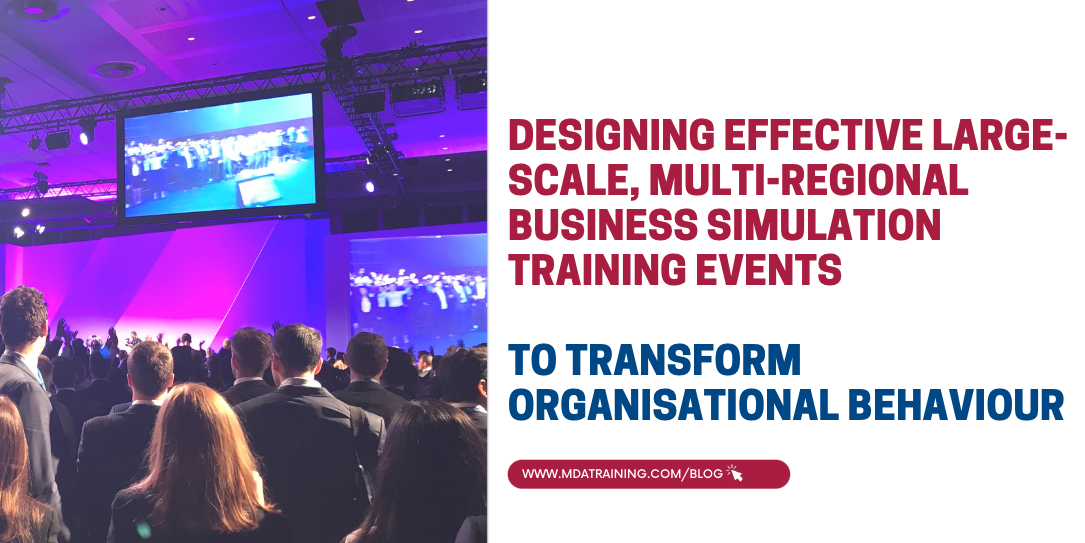Tag: Commercial Skills Training
-

Inclusive Learning Solutions for Underrepresented Groups and Disadvantaged Backgrounds
Promoting equality, diversity, and inclusion (EDI) is essential for creating a robust people management strategy in any organisation. EDI initiatives broaden talent pools by attracting individuals from underrepresented and disadvantaged backgrounds. Greater diversity promotes fresh perspectives, attitudes, and resilience, driving company growth. Attracting talent from underrepresented communities such as Black, Asian, LGBTQ+, and disadvantaged groups…
-

Designing Effective Large-scale, Multi-regional Business Simulation Training Events to Transform Organisational behaviour
In today’s fast-paced, ever-changing business environment, organisations must be able to adapt and evolve to meet new challenges and opportunities. To achieve this, companies need to invest in their people, providing them with the skills, knowledge and behaviours required to succeed. One effective way to achieve this is through large-scale, multi-regional business simulation training events. …
-

Effective Business Simulation Training for Professional Services (Consultancy) Sectors
Professional services, particularly the consultancy sector, play a crucial role in the growth and success of businesses. In order to deliver the best results for clients, it is imperative for consultants to possess a deep understanding of industry dynamics and operating models. This is where business simulation training comes into play, offering a powerful tool…
-

How can business leaders motivate their employees in January?
The Christmas break is a highly anticipated holiday for most, as people look forward to celebrating the festive season with family and friends and enjoying time away from work. However, the Christmas break can cause serious disruption to the day to day running of businesses, as specific agendas are pushed to the new year. This…
-

How can commercial skills training ease Brexit tensions in the workplace?
Whether employers like it or not; Brexit doesn’t appear to be going anywhere anytime soon. With this in mind, those in workplace leadership positions have a responsibility to ease tensions amongst employees by openly communicating any ramifications that may arise as a result of the United Kingdom leaving the EU. Fortunately, commercial skills and commercial…
-

3 steps to improving commercial skills training
Most business leaders will agree that developing the commercial skills of a workforce is pivotal in maintaining operations to a high standard as well as improving employee engagement. By developing the commercial acumen of a workforce, employees will become aware of exactly how the business operates and how the industry is evolving in order to…
-

How can your employees improve their commercial awareness every day?
Commercial awareness is a key skill that is highly sought after by employers. It revolves around the fundamental understanding of the company and relevant industry or sector from the employee. Employees should have an assured knowledge of the company they work for, including a broader knowledge about the industry that the company is situated in,…
-

Boosting the commercial skills capability of your workforce
Commercial skills have never been more in demand than now. Therefore, training should be conducted regularly in order to ensure employees possess relevant knowledge at all times. Human Resource is one of the most expensive and most valuable assets for any business and therefore ensuring that all of your employees have at least basic commercial…
-

How can commercial skills support young professionals at your business?
Commercial skills encompass the ability to understand what attributes contribute to the success of an organisation or business. Commercial awareness allows your workforce to understand the ‘why’ behind the tasks they undertake and allow them to work towards the overarching business goals. In order to successfully develop future leaders and motivate the younger workforce, employers…
-

What do employees in the UK look for in workplace leadership?
Due to the uncertainty of the UK’s post-Brexit future, UK workers are searching for simple workplace leadership to set the route for a currently unknown destiny. Faced with the ever-growing speed of progressive companies, businesses require secure and direct workplace leadership to steer their uncertain future going forwards. Businesses that are at the forefront of…